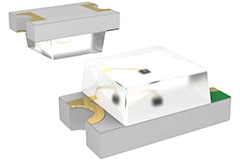
Dialight erweitert sein Portfolio um eine Reihe von SMD-LEDs, die in Taiwan hergestellt werden, und bietet seinen Kunden damit eine zuverlässige Bezugsmöglichkeit außerhalb Chinas.
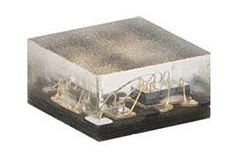 Adressierbare RGB-LEDs der Serie 587
Datum der Veröffentlichung: 2025-09-18
Adressierbare RGB-LEDs der Serie 587
Datum der Veröffentlichung: 2025-09-18
Die adressierbaren RGB-LEDs der Serie 587 von Dialight sind für eine fortschrittliche Beleuchtungssteuerung und dynamische visuelle Effekte ausgelegt.
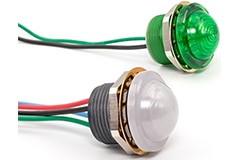 Wasserdichte LED-Leuchten der Serie 658 für die Panelmontage
Datum der Veröffentlichung: 2024-09-24
Wasserdichte LED-Leuchten der Serie 658 für die Panelmontage
Datum der Veröffentlichung: 2024-09-24
Die Anzeigeleuchten der Serie 658 von Dialight für die Panelmontage bieten robuste, wasserdichte Lösungen für viele Anwendungen und gewährleisten Langlebigkeit und Zuverlässigkeit in rauen Umgebungen.
 Rückseitig montierbaren Optopipe®-LED-Lichtleiter der Serie 515
Datum der Veröffentlichung: 2024-09-24
Rückseitig montierbaren Optopipe®-LED-Lichtleiter der Serie 515
Datum der Veröffentlichung: 2024-09-24
Die rückwärtig montierbaren Optopipe®-LED-Lichtleiter der Serie 515 von Dialight sind für vertikal in Bedienfelder montierte Anwendungen konzipiert, bei denen die Installation von der Rückseite der Frontplatte aus erfolgen muss.
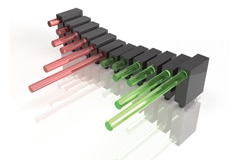 Optopipe®-Hohllichtleiter der Serie X/Y 515
Datum der Veröffentlichung: 2024-09-12
Optopipe®-Hohllichtleiter der Serie X/Y 515
Datum der Veröffentlichung: 2024-09-12
Die 3-mm-Optopipe®-Hohllichtleiter der Serie X/Y 515 von Dialight bieten eine deutliche, gut sichtbare Lichtanzeige und sind mit verschiedenen Längen und Höhen erhältlich.
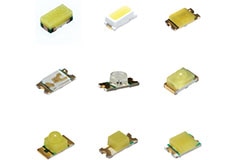 Weiße SMD-LEDs für verschiedene Anwendungen
Datum der Veröffentlichung: 2024-09-06
Weiße SMD-LEDs für verschiedene Anwendungen
Datum der Veröffentlichung: 2024-09-06
Die vielseitigen weißen SMD-LEDs von Dialight bieten eine überlegene Helligkeit und einen hohen Wirkungsgrad für verschiedene Beleuchtungsanforderungen.
 Adressierbare RGB-LEDs für vielseitige Anwendungen
Datum der Veröffentlichung: 2024-09-06
Adressierbare RGB-LEDs für vielseitige Anwendungen
Datum der Veröffentlichung: 2024-09-06
Die RGB-LED-Chips von Dialight können unabhängig voneinander programmiert werden, um verschiedene Farben, Muster und Helligkeiten anzuzeigen.
Find out how PRISM® SMD LED indicators help PCB designers minimize mixed technology on printed circuit boards, especially for multi-level, right-angle LED indicators.
Discover how Dialight's constant-intensity LED indicators solve voltage fluctuation issues, ensuring consistent brightness and reliability.
Our TIR optics leverage the physics of internal reflection to direct light with minimal loss. Available in a range of beam angles from narrow spot to wide flood, our optics shape and distribute light precisely where you need it.
Choosing the proper SMT LED for your application can provide additional safeguards against the impacts of electrostatic discharge during assembly and in the field.
Dialight’s white surface-mount (SMD) LEDs are the ultimate choice for status indication, white goods, industrial control systems, push button backlighting, and symbol lighting.
The following circuit board indicator overview is designed to help in the decision making process and provide a snapshot of the advantages, features, and considerations for each indicator type covered.
When incorporating LED indicators in printed circuit board (PCB) applications, design engineers must decide between surface mount technology (SMT) LEDs and through-hole technology (THT) LEDs.
These specific LED panel mount indicators feature waterproof designs with additional seals and robust housings that are shock and vibration-proof.
When it comes to selecting LEDs for circuit board indicators, the viewing angle plays a crucial role in determining visibility and brightness.
LED indicators are the quickest way to convey system status in a clear manner. Dialight offers the most form factors and color options for a wide variety of applications and industries.
Addressable RGB LEDs are energy efficient and can be powered by batteries or lowvoltage power supplies, making them suitable for portable and low-power applications.
This article delves into the fundamentals of addressable LEDs, exploring their components, operation principles, and the factors to consider when designing and implementing these cutting-edge lighting systems.
The various advantages of Dialight’s LED indicators such as durability, efficiency, and versatility are useful in a wide range of applications, including equipment status, warnings, target marking, low-light illumination, communication systems, simulation and training, and aviation lighting.








